Tag: Restaurant
Restaurant Owners’ Clapbacks: “The Customer Is NOT Always Right”
Online reviews can be a double-edged sword. They provide valuable insights from diverse perspectives. On the other hand, their reliability may be questionable as reviewers may be biased and give exaggerated or unwarranted reviews. As a business owner, what can you do if your establishment receives a fake negative review, whether as a prank or intentional harm? Some restaurant owners featured in this article opted to “clap back” by responding assertively. The article compiles examples from various sources to showcase how these owners refused to remain silent when their businesses were unjustly maligned online.
Troll from the future?
Although I’d like to think I’m smart enough to take online reviews with a grain of salt, even without the owner’s response, some reviews still leave me incredulous. For example, a recent review claiming that there was a fingernail on a waffle at a restaurant. How many things would have to go catastrophically wrong for this to happen? Moreover, it’s improbable that management would refuse to address such a serious issue. Fortunately, the restaurant owner responded and pointed out the flaws in the review, noting that the restaurant wasn’t even open yet. This underscores the importance of research and fact-checking before leaving negative reviews.

In today’s age of online anonymity, fake reviews can easily be left by bored trolls seeking to cause mischief or harm businesses. It’s essential to remember that these reviews can have a significant impact on a restaurant’s reputation and bottom line. As such, it’s crucial to verify the accuracy of reviews before believing and sharing them. In cases where reviews appear fabricated, it’s best to disregard them and rely on reputable sources instead.
Worm Pandemonium
In a world where negative online reviews can make or break a restaurant’s reputation, the dedication of an owner in responding to them can make all the difference. One such owner, who received a damaging review of his establishment, immediately began investigating the matter. Despite being initially baffled, he persisted in his research, eventually uncovering that the reviewer had stolen images from Google. With this knowledge, the owner could confidently reassure potential customers that the restaurant was clean and safe.

Instances like these demonstrate the importance of a restaurant owner’s willingness to go the extra mile to address negative feedback. By doing so, they can assuage potential customers’ concerns and even turn negative situations into positive ones. Moreover, it’s a testament to the owner’s commitment to providing a high-quality dining experience, which is undoubtedly an attractive quality for customers seeking a trustworthy establishment.
Badly Punctured
Some fake online reviews are so poorly constructed that it’s difficult to take them seriously. Consider a recent example where the reviewer claims that his reserved table was given away, even though there were plenty of other empty tables. Yet, despite this complaint, the reviewer begins by praising the service, which contradicts the notion that the experience was terrible. Furthermore, if there were so many empty tables, why was the reserved one necessary? If it was indeed given away, why didn’t the reviewer simply sit at one of the empty tables instead of leaving a negative review?

As if these inconsistencies weren’t enough, the restaurant owner responded and revealed that the reviewer’s entire account was false. Not only did the restaurant not serve the lobster the reviewer claimed to have eaten, but the details of the review simply did not match the restaurant’s layout or policies. Such egregious fabrications do nothing to help consumers make informed decisions and only serve to undermine the credibility of online reviews. Nevertheless, it’s reassuring to see that restaurant owners like this one are willing to defend their businesses against such baseless attacks.
Two Companies: A Narrative
While some negative online reviews may be straightforward, others can be shrouded in mystery, leaving readers curious about the backstory. This is particularly true of a review that appears to have been left by one business owner about a neighboring establishment. The review suggests that there is a great deal of animosity between the two businesses, and raises questions about the origin of the tension. What led Paris Jeweler to harbor such negative feelings towards Raymond, and vice versa? Is there a history of conflict or rivalry between them that we’re unaware of?

Another intriguing aspect of this review is how Raymond seems so certain that the reviewer is Paris Jeweler. Has he conducted some sort of online investigation, or is it based on past interactions? The mental image of the two business owners sniping at each other across the internet is both amusing and thought-provoking. In any case, this review highlights the importance of addressing conflicts in a professional and constructive manner, rather than resorting to online mudslinging.
Carry Yourself with Elegance
As a business owner, receiving a fake negative review can be frustrating and disheartening. However, there are different ways to respond to such situations. One approach is to adopt a snarky or witty tone, which can be entertaining for readers and boost the owner’s self-esteem. However, this approach may come across as unprofessional and may escalate the conflict with the reviewer.
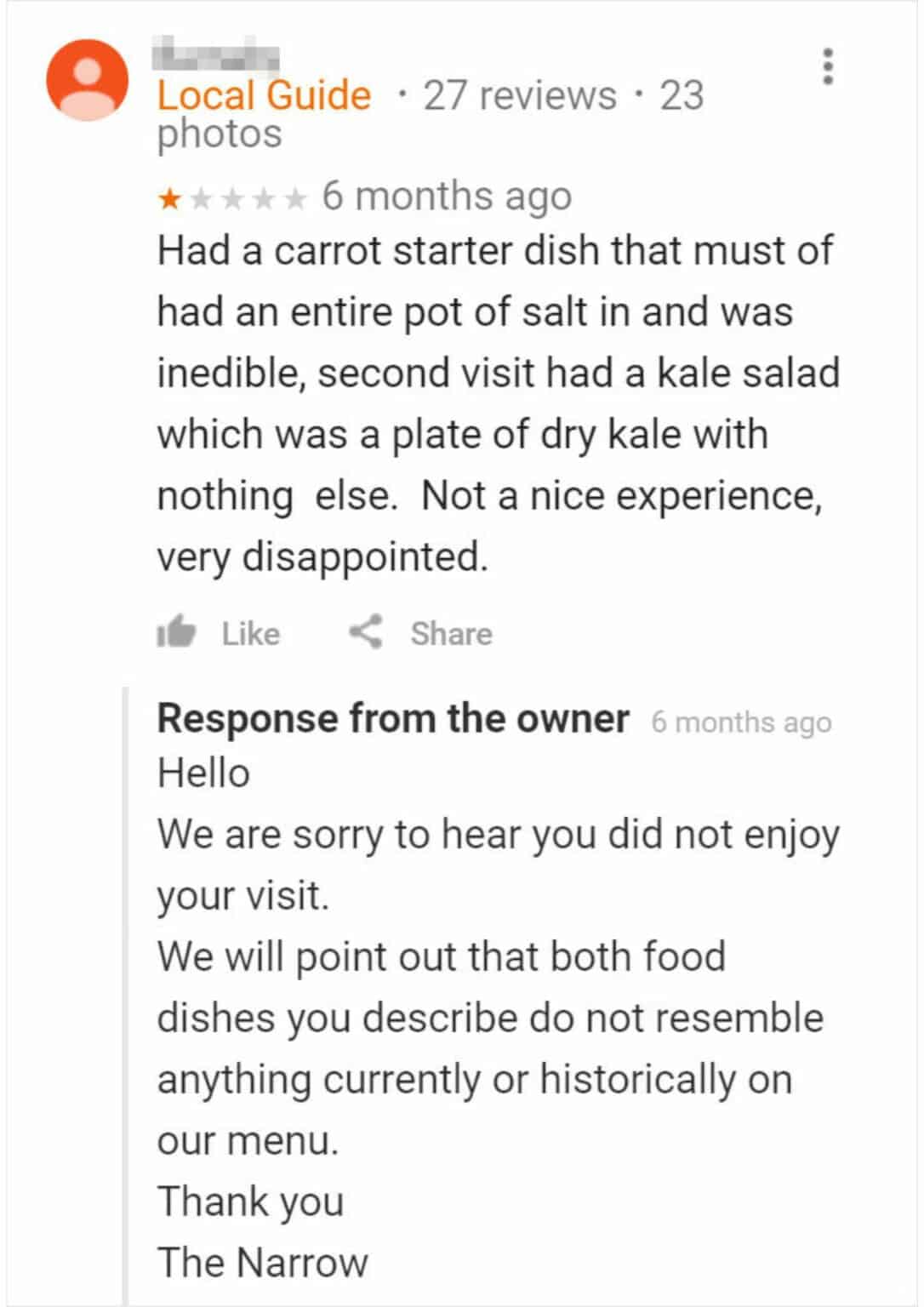
On the other hand, there’s the “classy route,” exemplified by a restaurant that responded to a negative review with polite and respectful language. The owners expressed their regret that the reviewer had an unpleasant experience, and then explained that the details of the review did not match the restaurant’s policies or layout. By taking this approach, the owners were able to defend their establishment’s reputation without stooping to the level of the fake reviewer. This demonstrates the importance of maintaining professionalism and integrity, even in the face of unfounded criticism.
Consider Vengeance
Unfortunately, the online world is not immune to the destructive behavior of trolls and other malicious actors. Many of the fake negative reviews we’ve examined seem to be the work of bored individuals seeking to cause mischief or harm businesses for no apparent reason. These actions are not only unethical but also reflect a worrying trend of online harassment and bullying.

However, there is another type of fake review that’s equally problematic: the revenge review. This type of review often originates from individuals who feel wronged by a business and seek retribution by leaving a negative review. For instance, someone who was refused service for not providing legal identification might leave a fake review expressing outrage and attempting to damage the establishment’s reputation. Such reviews are unfair and misleading and can have serious consequences for the businesses targeted. Furthermore, these reviews reflect a concerning trend of individuals who prioritize revenge over understanding and resolving conflicts in a constructive manner.
Disgruntled Parents
As a society, we cherish children and pets and often go out of our way to accommodate them. However, some parents and pet owners can take this expectation too far and assume that others should always tolerate their noisy or disruptive behavior. This can be especially frustrating in public places like restaurants, where a noisy or smelly child or pet can ruin the dining experience for others.
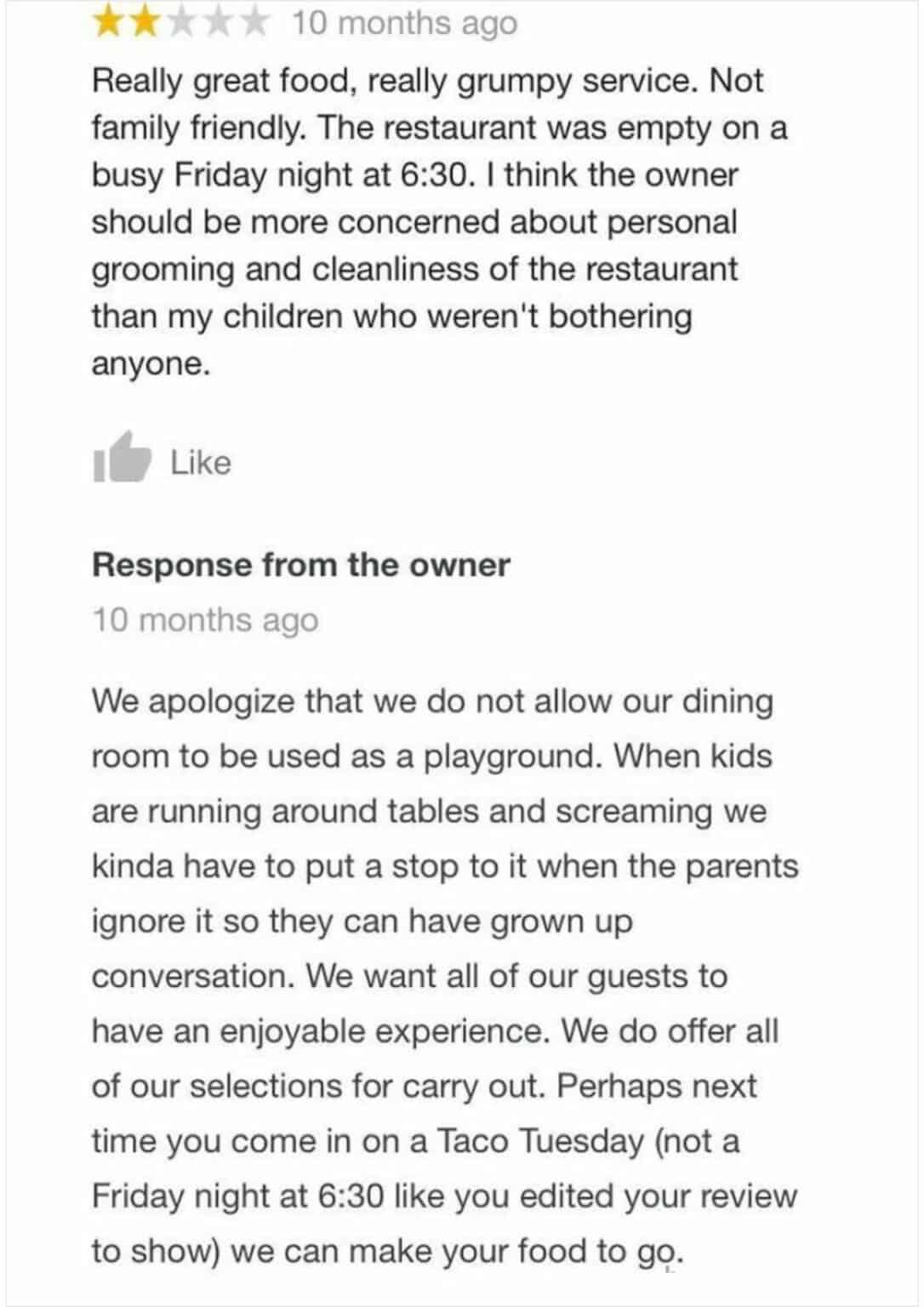
To these individuals, it’s important to remember that we live in a society where everyone deserves respect and consideration. It’s not fair to expect others to put up with your child’s tantrums or your pet’s behavior if it’s negatively impacting their experience. The responsible thing to do would be to either control the situation or leave, rather than forcing others to suffer. As members of society, we have a responsibility to be mindful of others and strive to create harmonious environments for everyone.
A Mooch at the Professional Level
Many food establishments, especially coffee shops and small cafes, have embraced a new business model of encouraging customers to bring their laptops and work there. By providing free wifi and electricity, these establishments hope to attract a new group of customers who are looking for a place to work outside of their homes or offices. It’s a mutually beneficial arrangement; customers can have a comfortable and productive environment to work in, while the establishment can generate revenue from food and beverage sales.

However, as with many good things in life, there are always individuals who take advantage of the system in the worst way possible. For instance, ordering only a couple of cheap drinks in exchange for using the restaurant’s electricity to charge multiple electronic devices for hours on end is not what these establishments had in mind. Such behavior not only undermines the financial sustainability of the establishment but also violates the spirit of the agreement. It’s important to remember that these establishments are businesses, and as such, they need to generate revenue to survive. Therefore, it’s essential to be respectful and mindful of the establishment’s expectations and to reciprocate their generosity by making purchases and supporting their business.
This Person Is the Employee of the Year
One of the downsides of the internet age is that it provides an anonymous platform for disgruntled individuals to air their grievances, sometimes to the detriment of innocent parties. This is particularly evident in the case of the revenge review, where someone leaves a negative review in retaliation for a perceived wrong. In this case, the review was left by a former employee who was unhappy about their dismissal.

What’s particularly perplexing about this review is that the employee used their real name and picture, making it easy for the restaurant owner to identify them. This raises questions about the employee’s motivations and thought processes. Did they truly believe that their negative review would harm the restaurant’s reputation and vindicate their own grievances? Or did they simply act impulsively in a moment of anger, without considering the potential consequences of their actions? Regardless of their intentions, this review serves as a cautionary tale about the importance of being mindful of one’s behavior and the potential consequences of leaving negative online reviews. As Jane Austen once said, “Angry people are not always wise.”
And now, a bright spot
It’s not uncommon to encounter fake negative reviews online, often left by malicious individuals seeking to harm a business or engage in online trolling. However, sometimes we encounter a review that breaks the usual formula and leaves us scratching our heads. In this case, the review is unexpectedly positive, praising the ambiance and the chicken dish at a restaurant.

However, as the owner of the restaurant points out, the review appears to be misplaced, as the dishes and ambiance described do not match the establishment in question. This raises questions about the reviewer’s motivations and thought processes. Did they simply make a mistake and post their review on the wrong page, or was there some other motive behind their actions? Regardless of their intentions, the owner’s integrity in acknowledging the mistake and not letting others be misled by the misplaced review is commendable. It highlights the importance of honesty and transparency in online reviews, and the need for businesses to monitor and respond to reviews in a responsible and ethical manner.
Rivalry, bitter
Online reviews have become a valuable tool for consumers to make informed decisions about the products and services they want to try. However, as with many good things in life, there are always individuals who find ways to misuse or abuse the system for their own gain. In the case of online reviews, this can take the form of business owners using reviews as a way to sabotage their rivals or boost their own business.

The motive behind such behavior is understandable; businesses are always looking for ways to attract customers and generate revenue. However, such tactics are unethical and can have serious consequences for both the businesses involved and the consumers who rely on reviews to make informed decisions. Furthermore, these actions can erode trust in the online review system, making it harder for consumers to distinguish between genuine reviews and those left with malicious intent. It’s essential for businesses and consumers alike to prioritize honesty and integrity in online reviews and to report any suspicious or unethical behavior to the appropriate authorities.
Problems with Tikka
Dining out at a new restaurant can be an exciting experience, especially when trying new dishes or visiting a family-style restaurant where dishes are meant to be shared. However, as with any new experience, there can be some confusion about the best way to navigate the menu and the dining experience.

In the case of these individuals, it’s understandable that they may have been confused about the portion sizes and whether dishes were meant to be shared or ordered individually. However, it’s important to remember that communication is key in such situations. Rather than assuming and blaming the restaurant for their confusion, it would have been better to ask a server for clarification or to look at other online reviews for more information. By doing so, they could have avoided misunderstandings and enjoyed their dining experience without any unnecessary stress or frustration. As consumers, we have a responsibility to communicate clearly with businesses and to seek out information when we have questions or concerns.
Honey attracts more flies than vinegar.
When faced with negative reviews that attack not only the quality of the food, but also the character and professionalism of the restaurant and its staff, it can be easy to feel defensive and respond in kind. However, as this example shows, sometimes the best response is not to get angry, but to remain calm and professional.
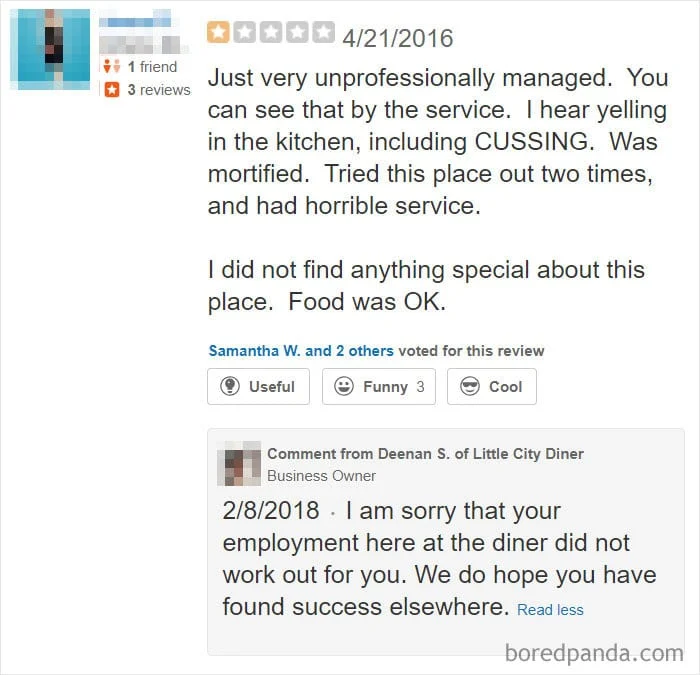
In this case, the restaurant owner chose to take the high road, responding to the review with a polite and measured explanation of the facts. By doing so, she was able to demonstrate her commitment to honesty and integrity, as well as her dedication to providing high-quality food and service to her customers. Moreover, she was able to discredit the reviewer’s claims and highlight the importance of conducting oneself with honesty and integrity, even in the face of unfair criticism. In an age where online reviews can make or break a business, it’s essential for business owners to prioritize professionalism and to respond to negative reviews in a constructive and respectful manner.
Blackmail over breakfast
Online reviews have become a critical component of the modern marketplace, but stories like this are disappointing as they show how people can weaponize them. This guy’s ability to blackmail restaurants into providing discounts using the threat of negative reviews is a reminder of how much damage a single negative review can cause. It makes one wonder how often he has gotten away with this scam. Despite the frustration that comes with monitoring online reviews and responding to negative ones, Kieran’s refusal to give in to this blackmailer is commendable.

As a restaurant owner, having to waste so much time monitoring online reviews and responding to negative ones can be frustrating. However, Kieran’s response to this review shows that there is hope. By responding to negative reviews and exposing fraudulent ones, restaurant owners can protect their reputation and continue to serve their customers without fear of being extorted. Although it’s discouraging to see how easily people can misuse online reviews, Kieran’s actions remind us that we can still fight back.
Pea Puree or Pesto?
Restaurants that prioritize educating their staff on dietary restrictions, allergies, and intolerances can make a huge difference for individuals with specific food requirements. Having a well-informed team that can explain the ingredients and precautions taken to avoid cross-contamination can make dining out a less stressful experience. It’s crucial to acknowledge that accommodating food restrictions is a difficult task that requires a lot of effort and resources, and it’s something that should be appreciated and valued.
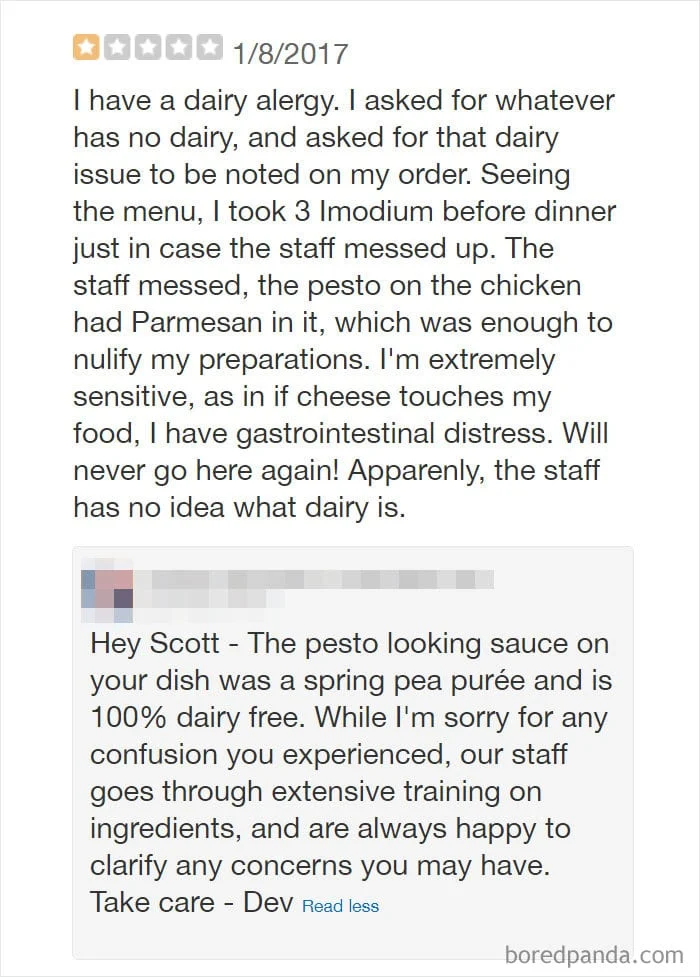
However, it’s disheartening to see how some diners react negatively despite a restaurant’s best efforts. In situations where diners make false assumptions about the ingredients or confuse dishes, it’s easy for them to leave negative reviews that can harm the restaurant’s reputation. It’s essential to recognize that restaurants that prioritize accommodating dietary restrictions and allergies are doing their best and should not be blamed for misunderstandings. By working together and communicating openly, diners and restaurants can create a positive and inclusive environment that caters to everyone’s needs.
Not Pizza
While most false reviews are created with the intention of harming someone or their business, some are the result of a simple mistake made by a befuddled reviewer. These reviewers may not be aware of the impact their review could have, and their unintentional mistake can harm a business’s overall star rating. While it may seem funny for an animal rehoming center to be criticized for their nonexistent pizza toppings, it can be frustrating for them to have their overall rating impacted by a review that is not relevant to their business.
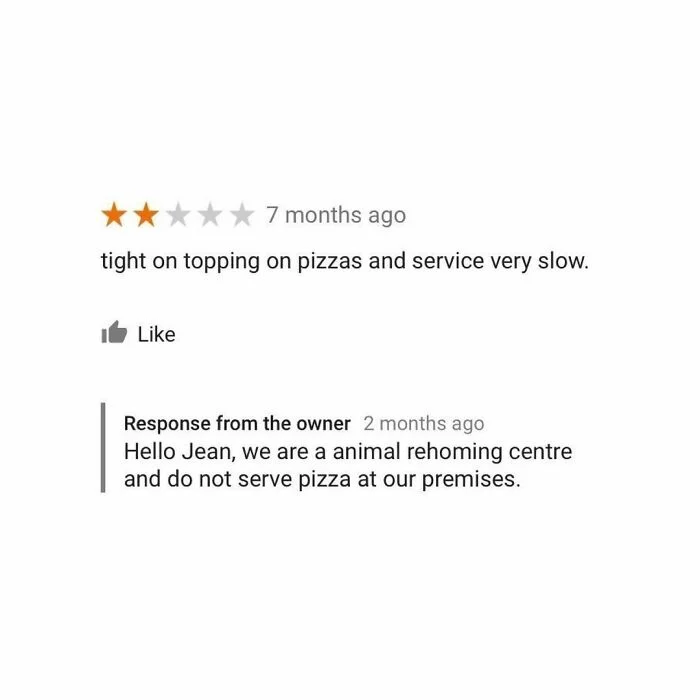
It is crucial for reviewers to take the time to ensure that they are reviewing the correct business and leaving an accurate review. This can help businesses maintain their reputation and provide valuable feedback for future customers. At the same time, it’s important for businesses to recognize that misunderstandings can happen and to handle them with grace and understanding. By working together, businesses and reviewers can create a fair and honest review system that benefits everyone involved.
COVID Returns
While the legitimacy of the review in question may be unclear, it highlights the subjective nature of taste and how it can be challenging to determine the authenticity of a review. While the reviewer claimed that the food had no flavor, the restaurant owner disagreed. This demonstrates the difficulties associated with evaluating food quality based solely on reviews. Nonetheless, customer reviews can be an essential tool for restaurants to understand their customers’ experiences and make necessary changes.

What makes this review particularly interesting is the restaurant owner’s sassy response. The COVID-19 pandemic was undoubtedly a challenging time for the restaurant industry, but it’s fascinating to see how this particular owner turned the situation into an opportunity to provide a clever retort. The humorous response has gained a lot of attention and demonstrates how social media and online reviews can provide an opportunity for businesses to showcase their personality and connect with their customers. Overall, this review serves as a reminder that customer feedback is essential, and businesses must take both positive and negative reviews with a grain of salt.
Khmer Expert
While traveling can be an enriching experience, it’s not uncommon to encounter individuals who become insufferably smug and condescending about their experiences. These travelers may visit a location for a short period and return with an inflated sense of expertise on the culture, food, or fashion of the area. However, this arrogance can lead to negative consequences, such as the case of a tourist in Cambodia lecturing chefs about their food not being sufficiently Cambodian.

It’s crucial to remember that brief tourism does not make someone an internationally renowned expert on a place, culture, or food. While travel can broaden our horizons and expose us to new experiences, it’s essential to remain humble and open-minded. Rather than claiming to be an expert, we should approach new experiences with a desire to learn and understand better. This approach can lead to more authentic and fulfilling travel experiences, fostering genuine connections with locals and a deeper appreciation of the culture.
Confused Calzones
While it’s essential to be understanding of people’s lack of exposure to different types of food, there is no denying the comedic value in Jenny’s review. Her outrage at only receiving half a pizza seems justified, but the pizza place’s response that she ordered a calzone is the punchline that made the situation so amusing. It’s possible that Jenny had never encountered a calzone before, which is a mistake that many people can make when ordering food online.

This situation highlights the importance of clear communication and understanding when it comes to ordering food online. As online ordering becomes more prevalent, it’s vital for restaurants to ensure that their menu items are labeled correctly, and customers understand what they are ordering. While Jenny’s review may have been unintentionally humorous, it serves as a reminder to businesses that they must ensure their online ordering systems are user-friendly and easy to navigate. Ultimately, clear communication can prevent misunderstandings and lead to a more positive customer experience.
Scary Situation
Sharing personal stories can be a great way to relate to others and provide context for our thoughts and feelings. In this case, the author shares a story about getting a pixie cut and the experience of having short hair. The story serves as a reminder that appearances can be deceiving, and assumptions based on appearances can lead to misunderstandings.
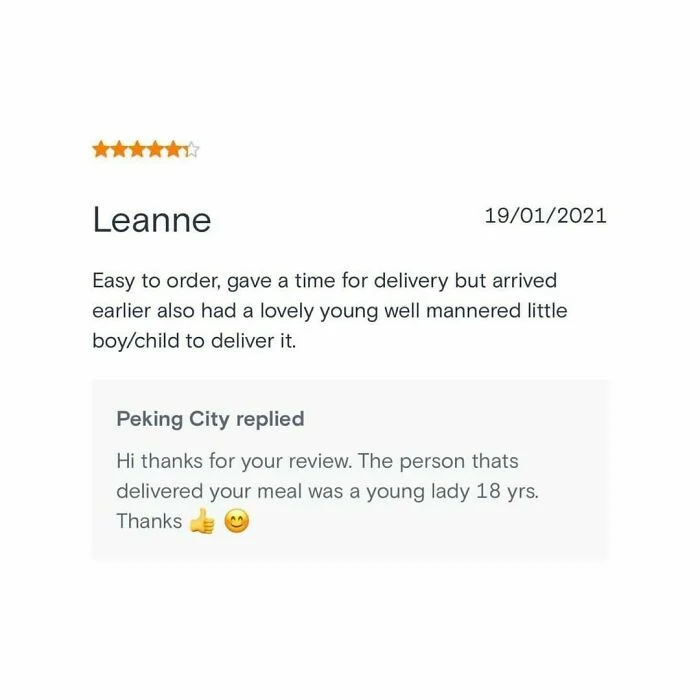
Regarding Leanne’s review, it’s not clear why she felt the need to mention the age and gender of the delivery person. It’s possible that she was attempting to provide more context for her experience, but it’s also possible that it was a subtle dig at the delivery person’s haircut. Regardless, it’s essential to remember that reviews can have a significant impact on a person’s reputation and should be approached with caution. As customers, we should strive to provide honest and constructive feedback that can help businesses improve. As for the delivery person, their appearance should not be a factor in the review, and they should be judged based on the quality of their service.
A Complainer
While some reviews may be included in lists like these because of their obvious fakeness or the hilarious clapbacks they receive, others are included purely for the humor they provide. This review, in particular, stands out for the response that it received, which was funny in its own right. However, it’s worth noting that not all reviews deserve to be mocked, and businesses must respond appropriately to criticism.

In looking into the screen name “George Complainer,” the author discovers that “Complainer” is, in fact, a real surname. This realization is thought-provoking as it highlights how a person’s name can impact their personality and overall demeanor. The idea of having a surname like “Complainer” is enough to put anyone in a perpetually bad mood. It’s crucial to recognize that reviews can have a significant impact on a business’s reputation, and responses should be thoughtful and measured. While it’s easy to laugh at humorous reviews, businesses must also take all feedback seriously and use it to improve their operations.
For Poor Spellers
While most of the reviews we’ve looked at have shown business owners in a positive light, this one is entirely different. The customer appears to be entirely reasonable, given that their food is 90 minutes late, and they’ve received no communication from the restaurant about what’s happening. It’s not uncommon for restaurants to experience delays or issues with deliveries, but it’s essential to keep customers informed and up-to-date about the situation.

On the other hand, the business owner’s response is less than impressive. His repeated misspellings of the word “accident” are amusing, but the fact that he failed to notify the customer of the delay is a significant problem. While it’s understandable that he was dealing with an unexpected event, failing to communicate with customers can lead to frustration and dissatisfaction. It’s crucial for businesses to be transparent and honest with their customers, particularly in difficult situations. By doing so, businesses can maintain their reputation and foster a sense of trust and loyalty among their customer base.
She Likes Toppings
This review raises many questions, and it’s difficult to understand how the customer could be so confused about what a Margherita pizza is. The reviewer complains that her pizza only had a crust, tomato sauce, and cheese, but that is precisely what a Margherita pizza is. It’s unclear what kind of pizza the customer was expecting, and it raises the question of whether she has ever had a plain cheese pizza before.
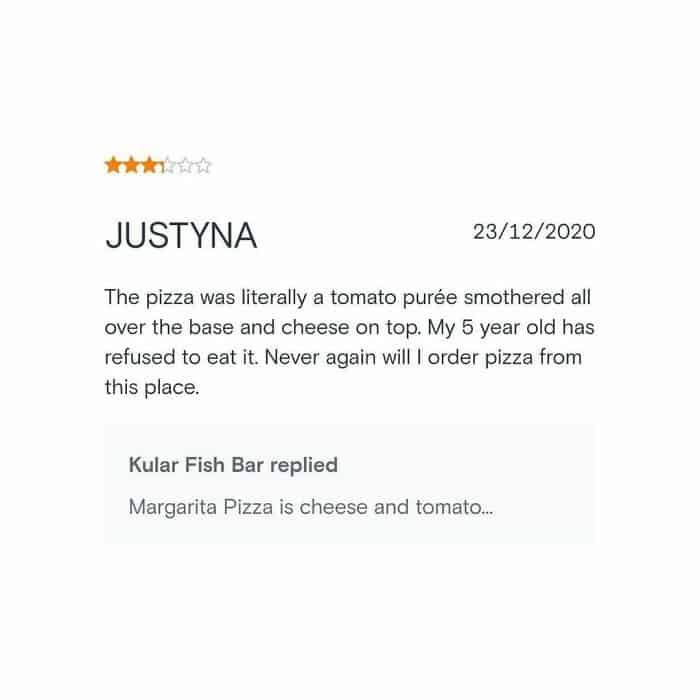
It’s possible that the customer has only ever had pizzas with a lot of toppings and wasn’t aware that there is another way to prepare a pizza. Alternatively, the customer may not have bothered to find out what a Margherita pizza is before ordering it. Regardless, the restaurant owner’s response is spot-on. It’s essential to understand what we are ordering and what it entails, particularly when it comes to unfamiliar dishes or menu items. By doing so, we can avoid confusion and ensure that we are ordering something that meets our expectations.
We Must Reduce Food Waste
When a business receives a bad review, it’s common for owners to worry and take immediate action to rectify the situation. They may speak with their staff to understand what went wrong, review the customer’s order to ensure accuracy, and offer apologies or discounts. However, not all business owners are concerned about negative reviews. Some are confident in their establishment’s reputation and don’t feel that one bad review will make a significant impact.

Regardless of their approach, it’s crucial for business owners to acknowledge and respond to negative feedback. While some reviews may be unfounded or exaggerated, others may highlight genuine concerns that require attention. However, it’s also important not to let negative reviews impact one’s confidence or self-worth. As seen in the example of a business owner who replied humorously to an angry customer, having a level of confidence and humor can help business owners to maintain a positive outlook and handle negative feedback with grace. Ultimately, how one responds to negative reviews can impact a business’s reputation, and it’s crucial to handle these situations professionally and with care.
Sickest Burns
Maintaining a positive reputation is crucial for any business, particularly restaurants, which rely heavily on customer reviews and public perception. When a customer leaves a negative review, it can be frustrating for business owners who have carefully cultivated their reputation. It can be particularly frustrating when the negative review is the result of a customer’s failure to read the menu or understand what they are ordering.
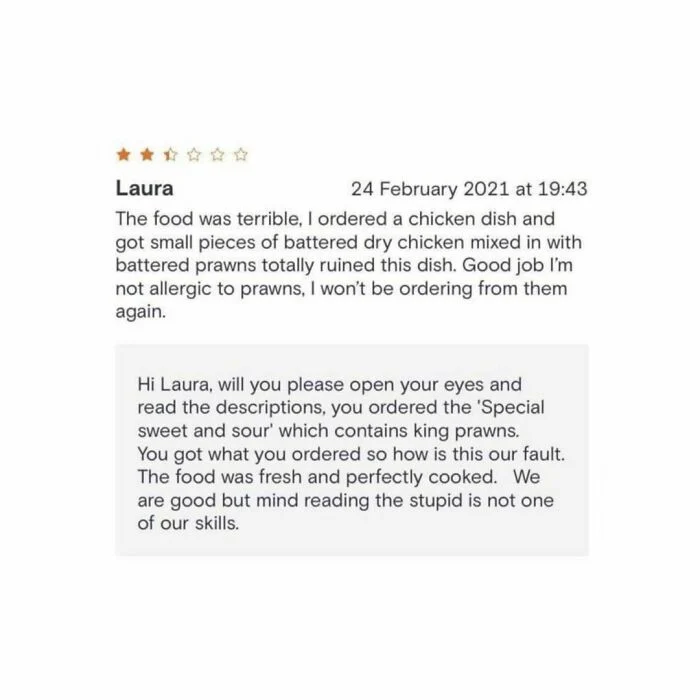
In this case, the restaurant owner’s sassy response highlights the absurdity of the situation. The owner encourages the customer to open their eyes and read the menu properly, and humorously points out that “mind reading the stupid” is not one of their skills. While the response may not win back the customer, it’s certainly entertaining for those reading the review. However, it’s essential to remember that how businesses respond to negative feedback can have a significant impact on their reputation. Business owners must approach negative reviews professionally and with care, even when the review is the result of a customer’s mistake.
Delivery Issue
In some situations, there really is no winning. In this case, a delivery person attempted to bend social distancing instructions to deliver food safely, but the customer was furious. The delivery person’s actions were likely an attempt to ensure that the food didn’t end up as a late-night snack for a fox. However, it’s clear that the customer was not pleased, raising the question of whether the delivery person’s efforts were worth the hassle.
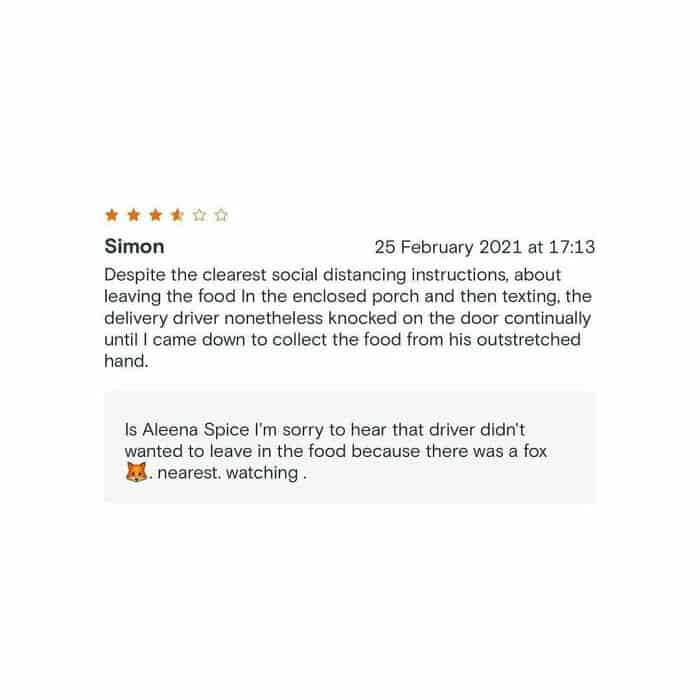
It’s not difficult to imagine a scenario where the delivery person left the food on the porch, as requested, only to have a fox get into it and eat it. In that case, the customer would likely call the restaurant back, demanding a refund or new food. It’s situations like these where there are no good options, and businesses must navigate carefully. Ultimately, the safety of the food and the customers must be the top priority, and business owners must do everything in their power to ensure that their operations are safe and hygienic.
Special Delivery
In this review, it’s difficult to determine who is in the wrong, if anyone. On one hand, the food arrived cold, which is understandably frustrating for the customer who was hoping for a warm and appetizing meal. On the other hand, the restaurant acknowledged the issue and offered a refund, which the customer refused. It’s a complicated situation that raises questions about customer expectations and restaurant responsibilities.

It’s worth noting that the customer ordered food for delivery at an unusual time, 3 AM, when most restaurants are closed. While the restaurant should strive to provide quality food and service, it’s also understandable that there may be limitations or challenges associated with late-night delivery. Ultimately, situations like these require communication and compromise. Both the customer and the restaurant should aim to understand each other’s perspectives and work towards a mutually satisfactory resolution.
Magic Carpet Would Help
There’s a certain level of comfort and convenience that comes with ordering food delivery, particularly on a snowy day when you don’t want to venture outside. However, it’s essential to remember that those delivering your food are real people who are dealing with the same weather conditions as you. It’s easy to forget that the delivery person has to navigate the same snowy roads and sidewalks that you were trying to avoid by ordering delivery.

While it’s understandable to be eager to receive your food quickly, it’s essential to have a little patience and empathy towards the delivery person. They are doing their best to get your food to you safely and quickly, despite the challenging weather conditions. As technology advances, we may see new delivery methods emerge, such as drones or self-driving cars, but until then, we must remember to be kind and considerate towards those who deliver our food.
Delivery Is Hard
Having friends who have worked as food delivery drivers, I understand that it can be a difficult and often thankless job. Drivers often face challenges, such as driving long distances without receiving a tip, dealing with rude customers, or encountering situations where they are unable to deliver the food. These challenges can be frustrating and demoralizing, making it all the more important for restaurants to support their drivers.

In this case, it’s commendable that the restaurant owner took the side of the delivery driver and called out the customer for giving the wrong phone number and not answering their door. While the adage “the customer is always right” has long been a standard in customer service, it’s important to remember that it’s not always true or fair. In fact, prioritizing the satisfaction of the customer over the well-being of the staff can lead to poor morale and high turnover rates. By supporting their staff and advocating for them, restaurant owners can build a better workplace culture and provide better service to their customers.
Trolls—Up? What’s
It’s perplexing why some individuals engage in disparaging a restaurant they have never visited. Does it bring them joy? Perhaps they are ex-bitter restaurant owners who want to ensure no one else can have a successful establishment. Alternatively, they could be the same trolls who enjoy writing hateful comments on news articles or YouTube videos. If you find yourself in this category, may I suggest finding a hobby? Perhaps take up crocheting or pickleball to bring more joy into your life.
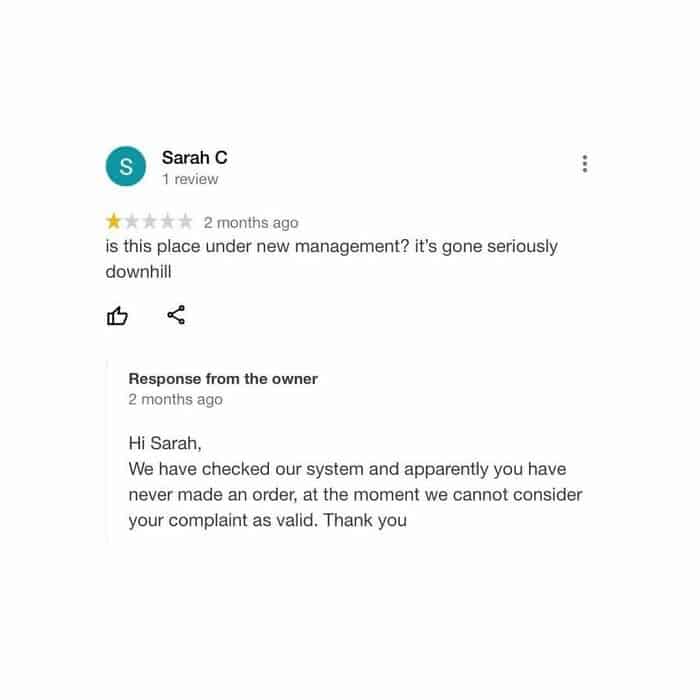
Ultimately, badmouthing restaurants without experience is unnecessary and cruel. It’s important to remember that behind every establishment is a team of hardworking individuals striving to provide excellent service and food. If you haven’t tried the restaurant, give it a chance before forming an opinion. And if you find yourself wanting to criticize, perhaps redirect that energy towards positive pursuits that bring joy to yourself and others.
Schrödinger’s Fries
It’s both amusing and frustrating when trolls make claims that are easily disprovable. For instance, a customer might complain about missing fries in their order, and then in the next breath, complain online about how greasy and soggy the fries were. It begs the question – were the fries soggy or nonexistent? It can’t be both, yet some individuals seem to be so angry that they unleash a barrage of insults without considering whether they make sense.
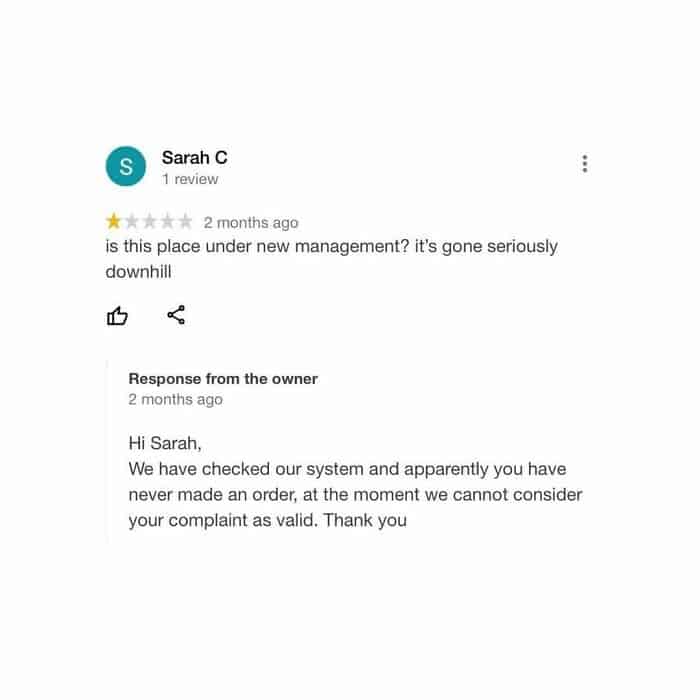
Perhaps these trolls are seeking attention or an outlet for their negative emotions, but it’s important to remember the impact their words can have on others. The restaurant staff may feel discouraged or unfairly attacked, and potential customers may be dissuaded from visiting the establishment. Before making baseless claims or engaging in online harassment, it’s essential to consider the impact on those involved. Instead, consider providing constructive feedback or addressing concerns directly with the restaurant.
Weird Trade
The exchange between the customer and business owner is perplexing on several levels. Firstly, the customer gives a high rating of 4.25 stars to a dish he describes as having “vile” sauce and “too crispy” chicken balls. It’s hard to understand how something can be so unappetizing yet still receive such a favorable rating. Secondly, the business owner chooses to ignore the food complaints and instead focuses on the customer’s location, berating him for not choosing a closer restaurant. This response does nothing to address the concerns raised and instead comes across as defensive and dismissive.

It’s important for both customers and business owners to take feedback seriously and approach it with an open mind. If a customer expresses dissatisfaction with a dish, it’s an opportunity for the business to improve and make necessary changes. On the other hand, responding defensively or ignoring the issue altogether can lead to negative consequences, such as loss of customers and damage to the restaurant’s reputation. As customers, it’s also essential to provide constructive feedback and avoid giving overly positive or negative ratings that don’t accurately reflect our experience. Overall, open communication and a willingness to listen and improve are key to a successful restaurant-business relationship.
Just Call
Initially, it may seem understandable that a restaurant’s delivery driver getting into an accident could result in delayed orders. Depending on the severity of the accident, a new driver may need to be sent out or the original driver may need to handle the situation before completing their route. However, upon further consideration, it’s understandable why the customer might feel frustrated. While getting into an accident is a valid reason for delayed service, the delivery driver had the customer’s contact information and could have communicated the delay in advance. Failing to do so can come across as unprofessional and may leave customers feeling misled.
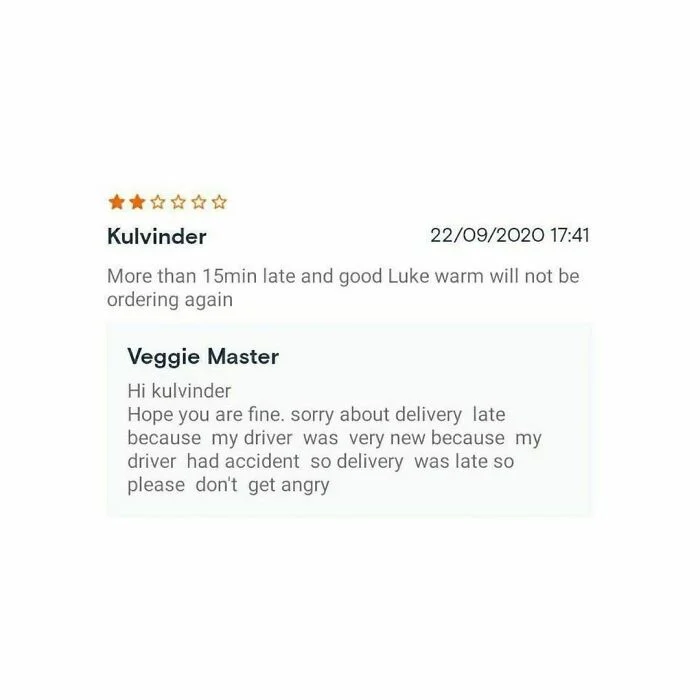
Effective communication is crucial in any business, especially in the food industry where timely service is expected. Even when things go wrong, customers appreciate transparency and honesty. As a business owner, it’s important to acknowledge mistakes and take responsibility for any delays or errors in service. Providing updates and solutions can go a long way in maintaining customer trust and loyalty. On the other hand, as customers, it’s important to approach situations with empathy and understanding, while still holding businesses accountable for the service they provide.
Cold Chips
It’s surprising how many negative reviews online are written with poor grammar and sentence structure. The language used can often be confusing or incoherent, making it difficult to understand the criticism being offered. It raises the question of whether the reviewer is capable of expressing their thoughts accurately, or whether they are simply venting their frustrations without much thought.
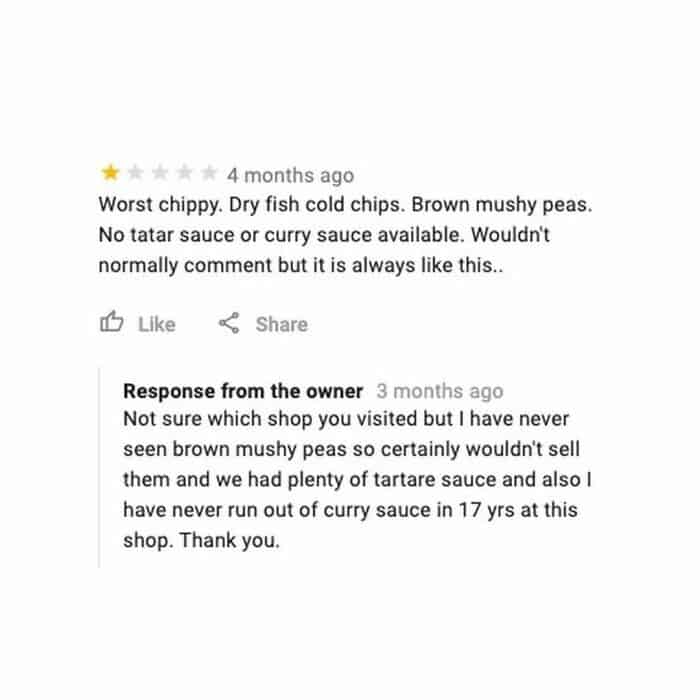
Food preferences can be highly subjective, and it’s not uncommon for individuals to have different tastes and opinions on certain dishes. For example, some people may enjoy mushy peas, while others may find them unappetizing. However, the idea of brown mushy peas that have been left out until they have oxidized is certainly concerning. It’s encouraging to hear that the shop owner claims to have never seen such a thing before, suggesting that it may be an isolated incident rather than a common occurrence. Regardless, it’s important for businesses to prioritize food safety and quality control to ensure that their customers are receiving the best possible experience.
Too Greedy
The grammar and language used in online reviews can often be subpar, and this is true for both customers and business owners. However, some replies take bad grammar to a whole new level and become almost poetic in their bleak beauty. One such reply reads, “you paid for too much extra / toppings you / People greedy too much toppings no.” It’s an interesting commentary on the increasing consumerism and the unfulfillable hunger for material possessions that plagues modern society. The reply captures the idea that we are constantly seeking more, often at the expense of others, and that this endless pursuit of excess can never truly satisfy us.
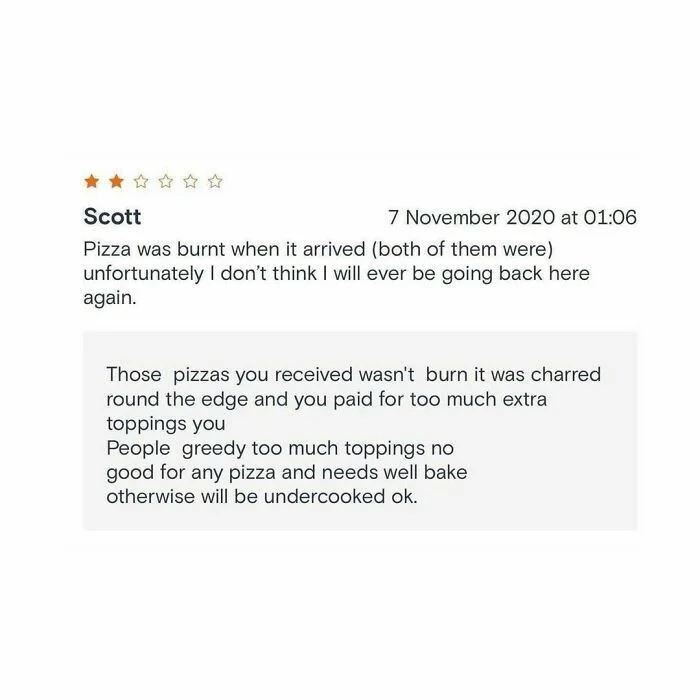
The exchange highlights the importance of effective communication and language use, not just for clarity but also for the impact it can have on others. Words have the power to inspire and evoke emotions, and even a simple reply can become a commentary on society and our values. As businesses and individuals, it’s important to consider the words we use and the messages we convey. Whether it’s a customer review or a business response, every interaction is an opportunity to connect and make an impact.
I Like the Term “Night Giggle Vision”
It’s unclear which side to take in this situation. If the owner truly replaced 7UP with Pepsi, then Dean’s frustration is understandable. While late delivery is frustrating, it’s difficult to determine what the complaint about basic customer service means without more information. However, regarding the issue with street numbers, if the delivery driver couldn’t read them due to insufficient lighting, the blame should fall on the city rather than the driver. Nevertheless, there could have been ways for the driver to overcome this challenge, such as using Google Maps or a flashlight to get a closer look at the house numbers.
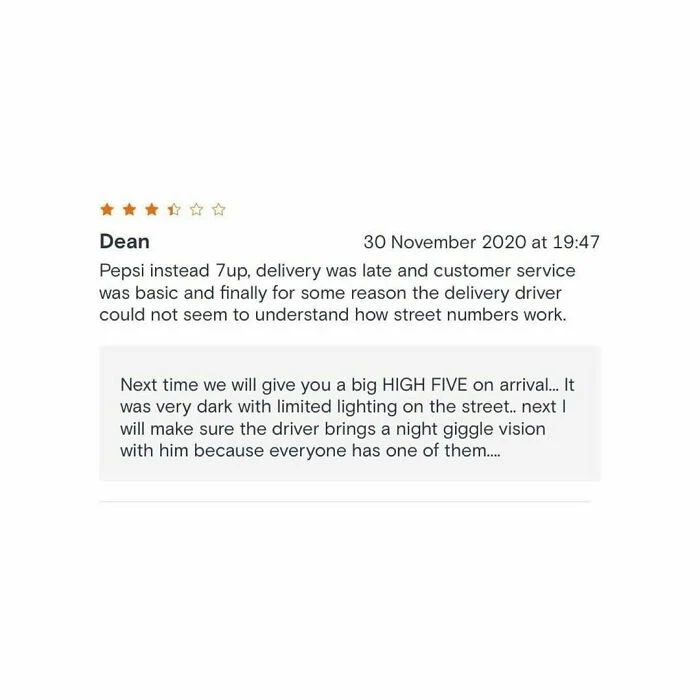
In summary, it’s challenging to make a definitive judgment on this situation. While some complaints seem valid, others are vague or require more context to understand fully. Although the darkness of the street may have posed a challenge for the driver, alternative solutions were available, such as using technology or a flashlight to locate the correct address.
Bad Katie!
The post in question appears to be a private exchange between a customer, Katie, and a restaurant owner. While the request made by Katie was reasonable, it’s understandable that the owner, who is not vegan, may not have immediately understood what would and would not be appropriate to serve. However, what’s concerning is that the private exchange was made public, seemingly for the purpose of ridiculing the restaurant and its staff.

It’s important to consider the impact of our words and actions, both online and offline. While venting frustrations and sharing experiences can be cathartic, it’s essential to do so in a way that is respectful and mindful of others. Publicly shaming individuals or businesses can be hurtful and can have long-lasting consequences. It’s important to approach situations with empathy and understanding, even when mistakes are made. As customers, it’s important to provide clear and constructive feedback to help businesses improve, while as businesses, it’s crucial to prioritize customer satisfaction and effective communication. Ultimately, kindness and respect should be at the core of all interactions, whether online or in-person.
Unconscious Bias
Human psychology plays a fascinating role in shaping our perception of events and experiences. The notion that our preexisting emotions and beliefs can influence our perception of reality is known as confirmation bias. For instance, if we are in a positive mindset, we are more likely to notice the good things around us, and conversely, if we are feeling negative, we are more prone to focus on the bad things. This bias can significantly impact how we interpret and react to situations.

The restaurant owner in this case suggests that Emma’s delayed food order led to her feeling dissatisfied with the entire meal. According to the owner, Emma was already in a negative mindset and was actively seeking reasons to dislike the food, regardless of their validity. It’s worth noting that this type of bias can influence not only our personal experiences but also how we perceive other people and their actions. Being aware of confirmation bias and actively working to counteract it can help us make more rational and fair judgments.
Long, Weird Trip
Melanie’s recent visit to a Chinese restaurant has sparked a series of revelations from the owner, and the story is quickly unraveling, akin to peeling back the layers of an onion. While Melanie has voiced her dissatisfaction with the experience, the owner’s response reveals more significant details that offer additional context. For instance, the owner notes that Melanie had previously visited the restaurant and expressed her enjoyment of it. Moreover, the same dishes that Melanie ordered were enjoyed by other patrons, further complicating the situation.
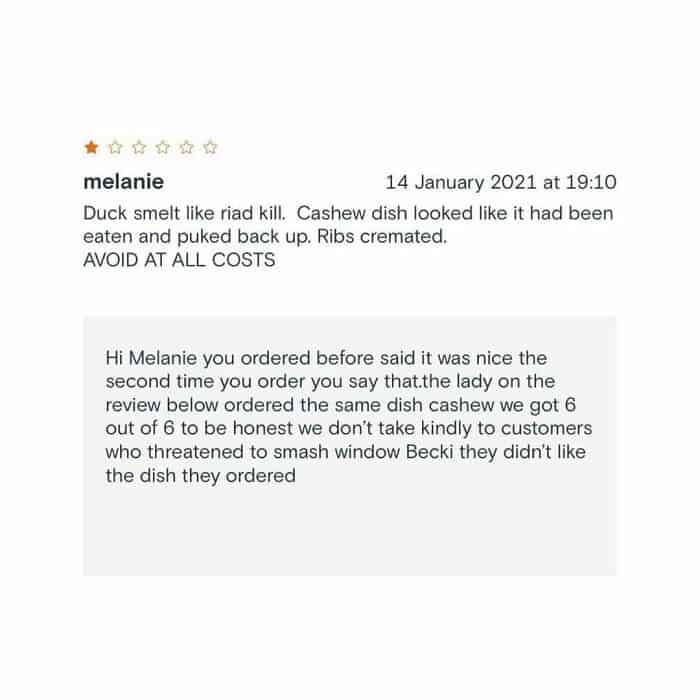
However, the most significant reveal comes when the owner discloses that Melanie made threats to damage the restaurant’s property during her visit. This new information adds another layer of complexity to the story, creating an emotional rollercoaster of a narrative. This situation highlights how a single event or experience can be interpreted in different ways by different individuals, depending on their perspective and emotional state. It also underscores the importance of context and information when trying to understand a situation fully.
Pasta Annoyed
It’s not uncommon to encounter individuals who seem to relish in being dissatisfied or disgruntled. In this case, the individual in question expresses his frustration with a lasagna dish that was not cooked to his satisfaction. While it’s understandable to be disappointed with a cold lasagna, it’s absurd to fault the restaurant for taking steps to rectify the situation. As the author notes, making lasagna is a time-consuming process, and it’s likely that the dish was pre-made, which is standard practice in most restaurants.

Furthermore, the reviewer’s criticism that non-Italian individuals shouldn’t be allowed to cook Italian food is not only unreasonable but also illogical. If one were to follow this line of thinking, then individuals from specific ethnic backgrounds should only be allowed to cook their native cuisine, which would be a limiting and discriminatory approach. The restaurant owner’s review of this individual’s past ratings further highlights his tendency to leave negative feedback, indicating that his opinion may be biased and not representative of the restaurant’s overall quality. Ultimately, it’s important to provide constructive feedback to help restaurants improve while also recognizing the effort and dedication that goes into running a successful establishment.
Disputed Delivery
In this situation, it’s challenging to determine where the blame lies as there are conflicting accounts of what occurred. The restaurant owner asserts that all deliveries would have left the building before 4:00 AM, while the customer claims that the food was not delivered until 6:00 AM and in poor condition. However, both accounts neglect to consider the actions of the delivery driver between leaving the restaurant and delivering the food.
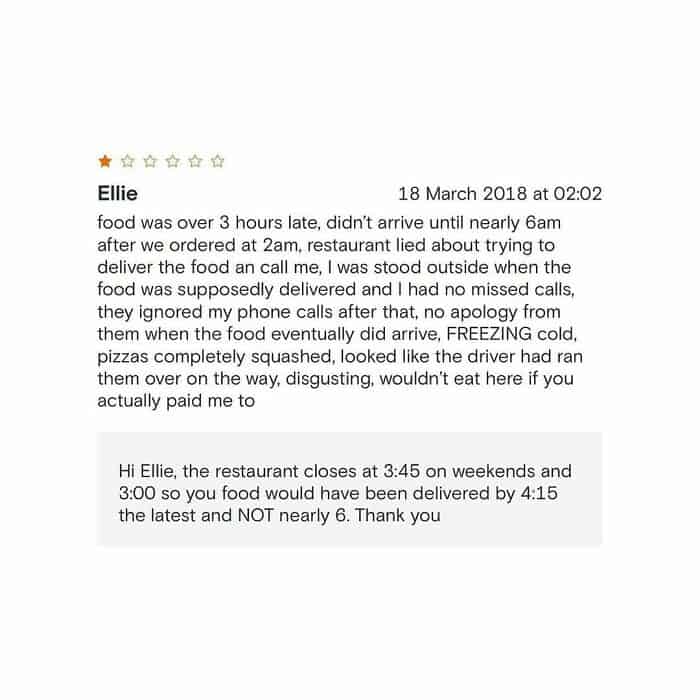
It’s possible that the driver may have delayed the delivery, perhaps by getting distracted or forgetting about the pizzas in his car. Alternatively, there may have been unforeseen circumstances, such as traffic or road closures, that delayed the delivery. Without more information, it’s difficult to determine who is at fault, if anyone. This situation underscores the importance of communication and transparency between customers and businesses, as well as the need for patience and understanding when things don’t go as planned.
Johnny is
This review and response are a bit of a mystery. The restaurant owner’s response is amusing but does little to clarify the situation. The customer’s mention of someone named Johnny and the phrase “just ring just eat” are perplexing, leaving readers to wonder about the context of the review. Additionally, the question of how Mary can retrieve her money remains unanswered.
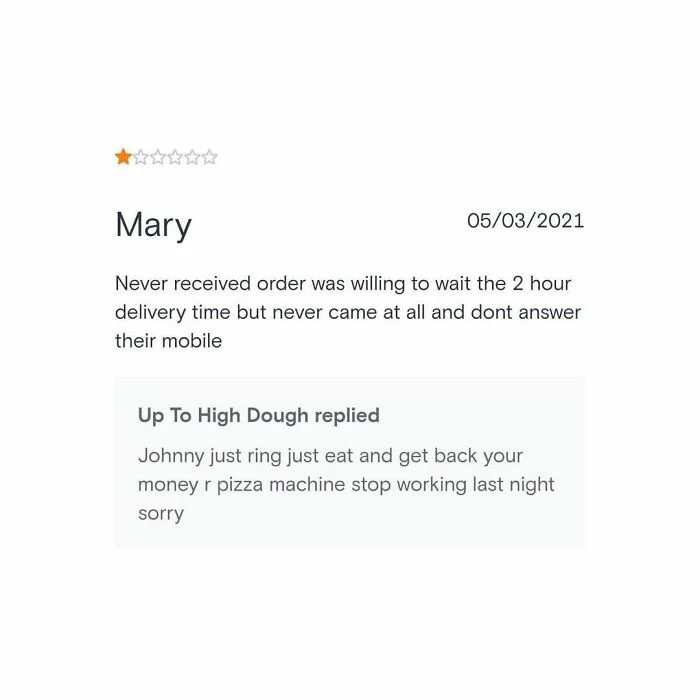
Moreover, the comment about the “pizza machine” raises more questions than it answers. If the machine had broken down, it would be reasonable to inform customers that orders could not be fulfilled. However, it’s unclear how a pizza machine could break down, as the process of making pizza involves a human element. The restaurant owner’s response leaves readers with more questions than answers, highlighting the importance of clear and concise communication when responding to customer feedback.
It’s Hot
One of the challenges of food delivery is ensuring that the food arrives at the customer’s location in optimal condition. While restaurants do their best to ensure that food is packaged and transported in a way that preserves its quality, customers must understand that there may be a delay between when the food is cooked and when it arrives at their doorstep. This delay can result in food that is not as hot or fresh as it would be if consumed on-site.
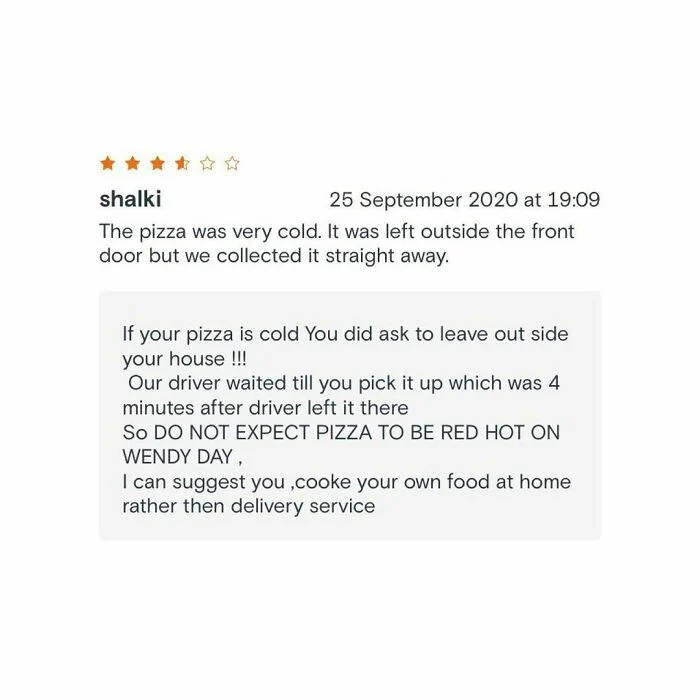
In this case, the restaurant owner is making it clear that customers should not expect pizza to be piping hot on “Wendy Day,” which is a bit of a mystery. Nonetheless, the message is clear: if customers want their food to be served red hot, they should consider cooking it themselves. While it’s reasonable for customers to expect food that is hot and fresh, it’s essential to recognize that delivery presents certain limitations that can impact the quality of the food. By setting realistic expectations and communicating effectively, restaurants can help ensure that customers are satisfied with their delivery experience.
